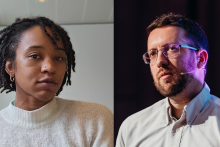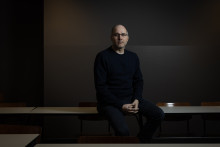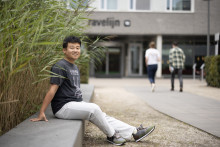The UT was founded to help the Eastern part of the Netherlands deal with major changes. As a result, the UT has earned interesting labels such as “the most entrepreneurial University” and “best university of technology”. Because the UT has always worked on helping society and industry to evolve, the university itself is also forced to evolve and to meet the needs of those we seek to help. A lot has changed since the 1960s when the UT was founded. It was in the 60s when KLM bought its first jet planes, bringing all global destinations within 24 hours of travel for the first time. Today, nobody is surprised when a colleague goes to a conference in Sydney. The world has become our playground.
In response to the ever-increasing globalization of society we see some dramatic changes in the UT. We have grown our international (and largely English-taught) curriculum and are receiving more international staff and students than ever before in our history. Approximately one third of our staff and students were not born in the Netherlands. The world is united on our campus with different backgrounds and languages - expanding perspectives and facilitating cultural exchange. With great staff from abroad, value is added to our community: growing our global network and visibility while bringing in fresh insights and ideas.
Anything worth having takes effort
Naturally, internationalisation doesn’t come without challenges. It brings complications that need to be taken seriously. Over the last few weeks a number of them have been pointed out quite explicitly: internationalisation causes some students to have trouble adjusting and we have come to realize that creating a cross-cultural community can be difficult. Unfortunately, not all articles have provided a welcoming tone and may have left some people feeling unwanted. We feel it is time to provide a little wider perspective.
Many complications have been discussed on various platforms, by various organisations. Grassroots movements have appeared and we notice that the organisation is serious in addressing these matters. Unfortunately, a part of the organisation draws the conclusion that internationalisation is bad for the university. We, the authors, see these matters more as temporary challenges and aim to support our community throughout this process of internationalisation.
Train talent
If we look at the role and position of the UT in the Netherlands, one of the core tasks is to provide the Netherlands with a steady stream of qualified graduates in order to support industry and society. (See also the Dutch law on higher education article 1.3: Universities are tasked with performing academic research, provide degree programmes in their domain and develop and transfer knowledge to society). In order to provide the Netherlands with the best knowledge and brains, it makes sense to look at the global talent pool, rather than just the Dutch. In fact, the Studium Generale, the medieval forefather of our modern universities, already realized this. They welcomed staff and students from all over, not just their own locality.
One could wonder whether international students just come here, get an education, and leave. Statistics show a more balanced picture: 41% of graduates from technical universities stay to live in the Netherlands after graduation. As such, almost half of them contribute back to the Netherlands. A good thing, because the Netherlands is drastically short of engineers.
International students have made a conscious choice for the Netherlands. They have left the known territory of home, the safety of friends and family, to travel to another country, sometimes even another continent. We see that one of the major factors in deciding where to go is the prospect of staying and living in the country after their studies. So, choosing for a study on our wonderful campus is often also a choice to try and start a life here in the Netherlands. In recognition of this, the Dutch government created the orientation year visa.
Find knowledge
Furthermore, if we may return to the example of a colleague who goes to Sydney for a conference… Knowledge is not limited by country borders. In fact, in order to really advance knowledge one should cross the borders and learn from our neighbours. We all rely on scientific insights from all over the world. The generation of scientific knowledge is an international, collaborative effort.
Modern day research and education is heavily dependent on this foundation of shared knowledge. Ergo, we must learn to work in an international context in order to ensure that the next generation of scientists and researchers thrive. On top of this, many graduates will be expected to function in international teams. Learning how to do this well in the protected environment of the university might just make them better professionals.
Build bridges
As a university of technology, we are the example of lifelong learning and continuous change. We live in a world where boundaries between cities, communities, universities, and workspaces are becoming more diffuse. To move forward, we have to embrace inclusion. Let us leverage our differences and build up on them instead of avoiding them. Well-managed international teams have proven to be more effective and better at problem solving than homogeneous groups. ATLAS, ITC, Creative/ Advanced Technology, the DesignLab, and Novel-T are great examples of how an international community can succeed. So, what can we learn from them?
By putting an effort in understand each other and bridge our differences, we have the potential to inspire, connect, and deliver. Cultivating an intercultural ecosystem opens doors to innovation and progress. The discussion on inclusion is not black or white however, and we should avoid getting caught up in rhetoric. This starts by listening, and respectfully exchanging opinions and experiences. We invite everyone at the University to facilitate this much needed bridge-building between Dutch and international staff and students. This creates an environment where everyone feels confident and welcome.
Let’s tackle our challenges with the mindset of solving them, to retain the UT’s position operating at the forefront of education and research.
Authors:
Sevim Aktas Student Advanced Technology, University Innovation Fellow, UC Member for UReka
Jelle Ferwerda Coordinator Internationalization, UC Member for CC, Country Coordinator Brazil
Arnav Mundkur Student Interaction Technology







